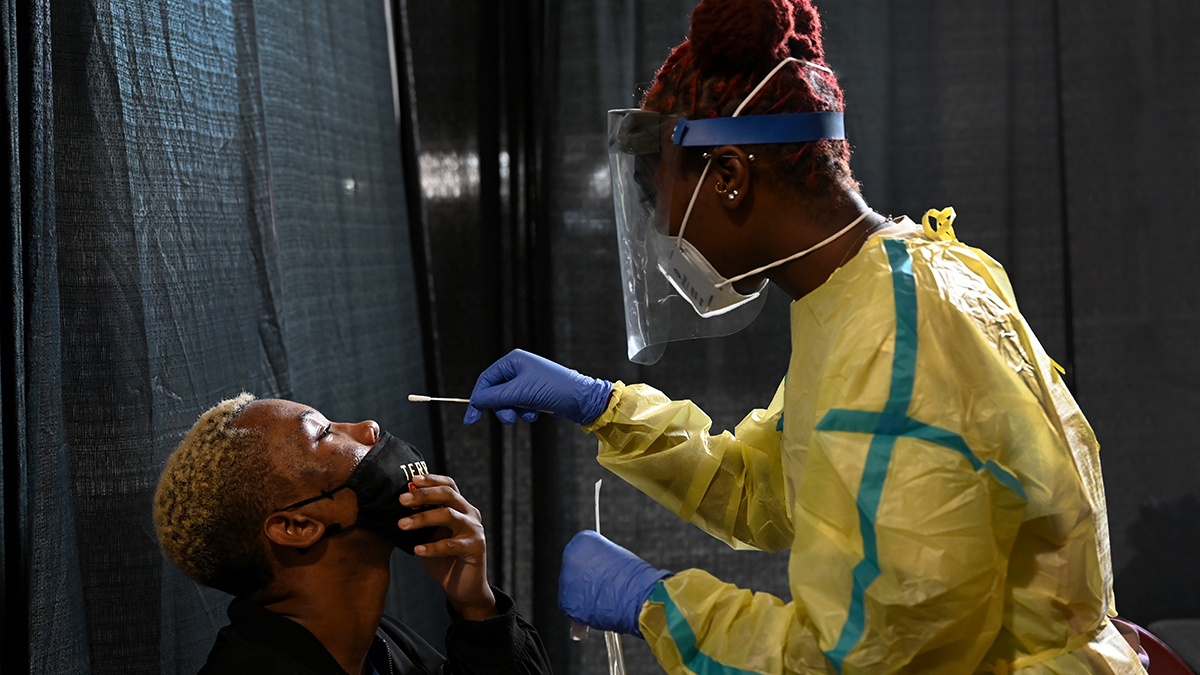AstraZeneca's vaccine may be the first proven to prevent people from spreading the virus.
The new study from Oxford University still needs to be peer reviewed, but the results indicate the vaccine reduces transmission by 67% and is 76% effective at preventing disease after one dose.
The vaccine hasn't been cleared by the FDA for use in the United States.
Officials say the Biden administration is on track to meet the president’s goal of giving out 100 million shots within their first 100 days in office.
Maryland Vaccination Sites
Maryland Gov. Larry Hogan said in his State of the State address Wednesday that the vaccine shortage is one of the top pressing issues.
“Unfortunately, right now the amount of vaccines being allocated by the federal government is just a tiny fraction of what we need. That is the hard truth not just for us in Maryland, but for every state in America,” Hogan said.
Two mass vaccination sites will open Friday in Maryland, including at Six Flags America in Prince George’s County. The county has contacted those eligible for first-round appointments.
The view from chopper 4 on Thursday shows the work the state’s national guard has done to get the Six Flags America site ready, but less than 24 hours before it opens questions and concerns remain.
With supplies limited, nine congressional Maryland democrats have called for a course correction on vaccination distribution and demanded answers to a series of questions, among them – how will the state-run mass vaccination sites coordinate with county health departments to avoid confusion?
The governor has said the sites are being setup now so there’s no delay when more vaccine is available.
The first batch of appointments are being given to individuals already on the county’s pre-registration list.
Appointments will be made available to all Marylanders after the county pre-registers those eligible for vaccinates on Friday, Gov. Larry Hogan's office said in a statement.
1 in 5 Virginians Don’t Plan to Get Vaccinated: Poll
Demand for the vaccine far outpaces supply, but many people aren’t eager to get the shot.
A new Wason Center poll found that 19% of Virginians said they would never get a COVID-19 vaccine. The number is higher among Black Virginians, at 26%.
Residents of Virginia who are Black are also less likely to rush to get the vaccine, the poll indicates. About half of white residents would get a shot as soon as one is available to them, compared to 29% of Black residents.
“This is consistent with concerns within the Black community that stem from historical mistreatment in medical research and health care,” Dr. Rebecca Bromley-Trujillo, research director of the Wason Center, said in a press release.
Differences are also evident among different political groups. More than half of Democrats say they would get a shot right away (56%) compared to 37% of Republicans surveyed.
The vaccinated population in D.C. may be overestimated in this map because some non-residents who work in D.C. are included in the totals.
Montgomery County, DC Target Vaccinations in High-Risk Communities
Montgomery County is planning to fight a disparity in who’s getting vaccines by targeting high-impact ZIP codes.
While the county's COVID-19 numbers are steadily improving, officials say the racial disparities in vaccine registration are concerning.
The majority of county residents who’ve signed up for a vaccination appointment are white.
Health officials will now dedicate a portion of the county’s doses to people in high-impact ZIP codes.
“The county doses will be based on case rates and death rates by race and ethnicity for folks living in those ZIP codes,” Dr. Raymond Crowel, Director of the Montgomery County Health Department, said.
Like Montgomery County, D.C. is also prioritizing residents in areas considered high-risk. At 9 a.m., 1,800 vaccine appointments opened for D.C. residents who are living in priority ZIP codes in Wards 5, 7 and 8.
At 9 a.m. Friday, nearly 2,000 appointments will open for residents citywide. Groups currently eligible for a vaccine in D.C. include people over 65 and those who work in health care settings.
Amid complaints that seniors were struggling to access vaccine appointments online, D.C. launched a "senior vaccine buddy" program that will connect those needing help with volunteers from the mayor's office staff. Seniors will be contacted about potential participation.
D.C. is also working to give COVID vaccines to residents who are experiencing homelessness. So far, 115 members of the community have received their first shot.
“We’re all safer when people are vaccinated,” Director of the D.C. Department of Human Services Laura Zeilinger said. At least 24 residents experiencing homelessness have died from COVID-19 and more than 460 have tested positive for the virus.
D.C. residents who are over age 65 and veterans can contact the Washington D.C. VA Medical Center for appointments at 202-745-8000.
Capitol Police Says It Has Secured Vaccines for All Employees
U.S. Capitol Police have secured enough doses of COVID-19 vaccine to give shots to all employees, Acting Chief Yogananda Pittman said in a press release Thursday.
The department expects vaccines will be delivered in the near future and is working with the Office of Attending Physician to administer the shots.
Pittman thanked House Speaker Nancy and the Biden administration for helping to acquire the vaccines.
What the Data Shows
Low case increases and hospitalizations were reported around the capital region today.
D.C. reported 166 new cases and six additional deaths. Maryland had 1,554 new cases and 31 deaths. Virginia recorded 1,998 new cases and 43 lives lost.
Seven-day averages fell sharply across the board. D.C. had a five-day streak of declining cases – average cases dropped to 176 on Thursday.
Maryland’s seven-day average is now at 1,470, with cases falling for a week straight. Virginia is down to 2,301 average cases, following six consecutive days of decline.
Nearly 2.5 million doses of vaccine have been distributed throughout D.C., Maryland and Virginia, according to CDC data. About 1.51% of the population in Maryland and 1.62% in Virginia have now been fully vaccinated.
When D.C. last reported a figure, almost 1% of the city's residents had been vaccinated. Nesbitt said Thursday that 70-80% of the population needs to be for herd immunity, which is when the general population is protected from a disease's spread.
A recent poll conducted by the Wason Center found that 67% of Virginians personally know at least one person who has been infected with COVID-19. Almost one-third of the poll’s respondents also knew someone who had died of complications related to COVID-19.
Vaccination Portals by County
As vaccinations in our region ramp up, here's a look at local portals residents can use to sign up for vaccination appointments or sign up to receive alerts.
- Washington, D.C. signups– vaccinate.dc.gov
- Maryland signups – www.marylandvax.org/ and covidvax.maryland.gov
- Virginia information – www.vdh.virginia.gov/covid-19-vaccine/
- Montgomery County – www.montgomerycountymd.gov/covid19/vaccine/
- Prince George's County – www.princegeorgescountymd.gov/3730/COVID-19-Vaccination
- Howard County – www.howardcountymd.gov/Departments/Health/MM-Alerts-and-Recalls/COVID-19-Vaccine
- Anne Arundel County – aahealth.org/covid-19-vaccine-faq/
- Fairfax County – www.fairfaxcounty.gov/health/novel-coronavirus/vaccine
- City of Alexandria – www.alexandriava.gov/health/info/default.aspx?id=119270
- Loudoun County – www.loudoun.gov/covid19vaccine
- Prince William County – coronavirus.pwcgov.org/vaccine-information/ & VDH
To get a better idea of when you'll be eligible to receive a vaccine, use our tool below.
Local Coronavirus Headlines
- Health officials confirmed Maryland's first case of COVID-19 caused by the new variant first identified in South Africa, then another two cases in Montgomery County residents.
- Many D.C. restaurant workers who already were coping with the safety hazards and financial impacts of the COVID-19 pandemic also are facing increased sexual harassment, a new report from a labor organization says.
- Face masks are now required in all National Park Service buildings, and on land maintained by the Park Service when physical distancing is not possible, federal officials announced Tuesday.
- Bars and restaurants in Maryland will be able to remain open past 10 p.m. starting Monday, Feb. 1, the governor announced. Restaurants will still be capped at half-capacity indoors.
- Nursing homes and rehabilitation facilities in the D.C. region are still working to convince some of their employees that it's safe to get the COVID-19 vaccine.
- Hogan outlined plans to put the infrastructure in place to speed up COVID-19 vaccinations when a higher volume of doses becomes available. Six mass vaccination sites are planned, including one at Six Flags America.
- Georgetown University says it will discipline medical students who received COVID-19 vaccines though they were not eligible to receive them.
- Just as millions of Americans are rolling up their sleeves for a COVID-19 vaccine, the News4 I-Team has learned the outgoing Secretary of Health and Human Services made it much harder to get compensated for the most common vaccine injury.
- D.C.’s child care workers are asking officials not to push back their COVID-19 vaccinations.
- Maryland Gov. Larry Hogan says school districts should resume in-person learning by March 1 or face legal action, which the state teacher's union says is a threat to educators.
- Maryland reported its first two confirmed cases of the U.K. variant of COVID-19.
- A professor is using the trust Black Americans have in barbers to make them more comfortable with taking the COVID-19 vaccine.
Reopening Tracker
- The Fairfax County School Board voted unanimously Tuesday afternoon to bring all students back in-person for hybrid learning by March 16.
- D.C. has lifted its ban on indoor dining, but libraries and recreation centers are still closed.
- Virginia instituted a curfew and a stricter mask mandate.
- Maryland tightened restrictions on businesses, bars and restaurants.
- All Smithsonian museums and the National Zoo are closed because of rising COVID-19 cases.
- Hours before some Fairfax County students were set to return to in-person learning, the school district said that they needed to delay the plan.
- Courts throughout Maryland remain partially shut down due to the pandemic.
- Prince George's County tightened restrictions and required masks to be worn outdoors.
How to Stay Safe
Anyone can get COVID-19. Here are three simple ways the CDC says you can lower your risk:
- Wear a snug-fitting mask that covers your nose and mouth.
- Avoid being indoors with people who are not members of your household. The more people you are in contact with, the more likely you are to be exposed to COVID-19. If you are indoors with people you don’t live with, stay at least six feet apart and keep your mask on.
- Wash your hands often, especially after you have been in a public place.



